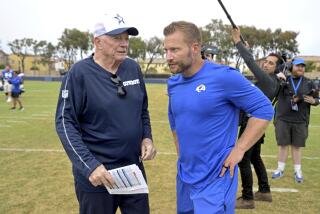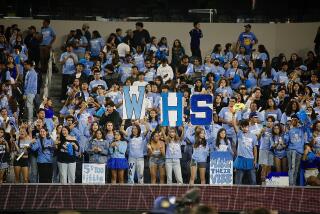Stadium proponents hope NFL turns attention to L.A.
Once the dust settles on the NFL’s new labor agreement, will the league finally start pushing dirt in Los Angeles?
That’s what backers of the competing L.A. stadium proposals are hoping, that team owners will turn their attention to the nation’s second-largest market now that their first-largest nightmare — a bitter fight with the players — is over.
“For us, the timing is perfect because it’s coming at the same time we’re finishing what no one thought we could do, which is a deal with the city,” said AEG’s Tim Leiweke, who hopes to know by the end of the month whether the L.A. City Council will issue roughly $300 million in bonds and approve the just-completed memorandum of understanding for a stadium deal. “It puts a whole new amount of momentum and pressure on us to get going.”
Likewise, the point man for Ed Roski’s stadium proposal in Grand Crossing (formerly City of Industry) sounds as if they’re treating the labor deal like a second starter’s pistol, a call to re-emphasize the merits of their plan.
“Ed has never felt it was the right thing to do during a lockout to try to get the owners to focus on L.A.,” said John Semcken, Roski’s right-hand man. “They had something more important. Now, we want to demonstrate why we think our project is the best for the league, the best for a team, and the best for our fans.”
At the moment — and this can change with the ever-shifting stadium landscape — downtown has the momentum. That is the preferred plan of many influential NFL owners, and signs point to the L.A. City Council approving the roughly $300 million in bonds to relocate the West Hall of the Convention Center, where the proposed Farmers Field would sit. Leiweke now says the vote might not happen by his original July 31 target date.
“This may slip into the first week or two of August,” he said in a recent interview. The council goes on a two-week break starting Aug. 23. “As long as we’re going to get it done before they recess, that’s the key. From a timing standpoint, we’d like it closer to July 31 but we understand.”
Leiweke’s timeline calls for getting the plan entitled and a long-term agreement with a franchise in time to break ground on a new West Hall by June 1, 2012. According to that plan, a team would be playing in L.A., at the Coliseum or Rose Bowl, by next season and would be ready to move into Farmers Field for the 2016 season.
Assuming those bonds are approved — and there are strong indications they will be — AEG’s next step will be twofold: continuing the process of getting the land entitled and getting an agreement from a team.
The entitlement process is likely to be sticky. Roski has a completed environmental impact report, plus an environmental exemption from the state that swatted away the last remaining legal challenge to his plan.
AEG isn’t likely to get the same exemption — the climate for those has changed in Sacramento — and that means the Farmers Field project, which also will go through the EIR process, won’t be as legally bulletproof. And that’s Leiweke’s main concern, that someone will file a lawsuit with the sole intent of derailing the project.
That’s why he’s been making frequent trips to Sacramento, talking to legislators and trying to secure a modified version of the exemption Roski got, one that calls for binding arbitration of disputes arising from the Farmers Field EIR, instead of fights that will slog through the courts.
“What we want is a process that doesn’t get dragged on for years,” he said.
NFL fans in L.A. are used to that, deep into their second decade without a hometown team.
Leiweke is convinced that era is coming to a close.
“When we started this process a year and a half ago, I think most people kind of looked at us, laughed, and said, ‘Good luck.’ No one thought we’d pull it off,” he said.
“And now we’re sitting here, and what’s changed immensely is everyone is looking around and saying, ‘They’re going to pull it off. They’re going to get a deal done with the city. This is going to happen.’ ”
More to Read
Go beyond the scoreboard
Get the latest on L.A.'s teams in the daily Sports Report newsletter.
You may occasionally receive promotional content from the Los Angeles Times.











